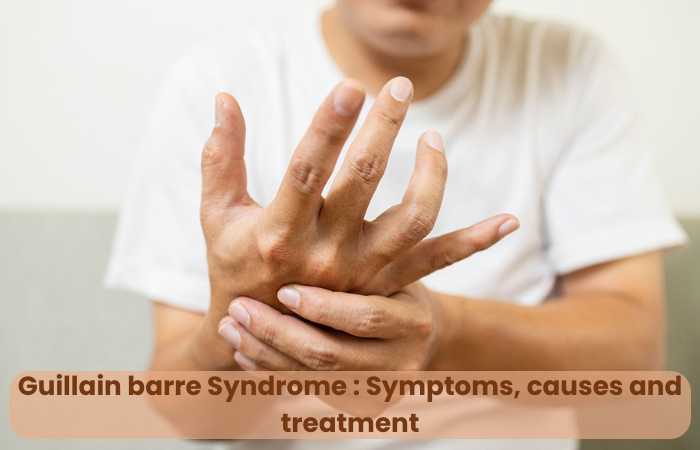Guillain-Barré Syndrome (GBS) is a rare but serious neurological disorder that affects the peripheral nervous system. It occurs when the body’s immune system mistakenly attacks the nerves, leading to muscle weakness, numbness, and, in severe cases, paralysis. While GBS can be frightening, early diagnosis and treatment can significantly improve outcomes. In this blog, we’ll explore the symptoms, causes, and treatment options for Guillain-Barré Syndrome.
What is Guillain-Barré Syndrome?
Guillain-Barré Syndrome is an autoimmune disorder where the immune system targets the nerves outside the brain and spinal cord. This damage disrupts the communication between the nerves and muscles, leading to a range of symptoms. GBS can affect anyone, regardless of age or gender, but it is more common in adults and older individuals.
Symptoms of Guillain-Barré Syndrome
The symptoms of GBS often develop rapidly and can worsen over a few days or weeks. Some of the most common signs include:
- Muscle Weakness: This usually begins in the legs and can spread to the arms and upper body. In some cases, it may lead to complete paralysis.
- Tingling and Numbness: Many patients experience a “pins and needles” sensation in their fingers, toes, or limbs.
- Difficulty Walking: Weakness in the legs can make it hard to walk or climb stairs.
- Pain: Some individuals report muscle pain, cramping, or aching, especially at night.
- Facial Weakness: GBS can affect the muscles of the face, leading to difficulty speaking, chewing, or swallowing.
- Breathing Difficulties: In severe cases, the muscles that control breathing may become weak, requiring immediate medical attention.
If you or a loved one experience any of these symptoms, it’s crucial to seek medical help immediately.
Causes of Guillain-Barré Syndrome
The exact cause of GBS is not fully understood, but it is often triggered by an infection or illness. Some common triggers include:
- Viral or Bacterial Infections: GBS frequently follows infections such as the flu, Epstein-Barr virus, or Campylobacter jejuni (a common cause of food poisoning).
- Vaccinations: In rare cases, GBS has been linked to certain vaccines, though the risk is extremely low.
- Surgery or Trauma: Some individuals develop GBS after undergoing surgery or experiencing physical trauma.
Researchers believe that these triggers cause the immune system to malfunction, leading it to attack the nerves.
Diagnosis and Treatment
Diagnosing GBS involves a combination of physical examinations, medical history reviews, and diagnostic tests such as nerve conduction studies and lumbar punctures. Early diagnosis is critical to managing the condition effectively.
Treatment options for Guillain-Barré Syndrome include:
- Intravenous Immunoglobulin (IVIG): This therapy involves injecting healthy antibodies to block the harmful ones attacking the nerves.
- Plasma Exchange (Plasmapheresis): This procedure removes the harmful antibodies from the blood.
- Physical Therapy: Rehabilitation helps patients regain strength and mobility during recovery.
- Supportive Care: In severe cases, patients may require breathing support or other intensive care measures.
Most people with GBS recover fully, but the process can take months or even years. Some individuals may experience lingering weakness or fatigue.
Prevention and Outlook
While there is no sure way to prevent GBS, maintaining good hygiene and avoiding infections can reduce the risk. If you’ve recently had an infection and notice unusual symptoms, consult a healthcare professional promptly.
The outlook for GBS patients is generally positive, especially with early intervention. Most individuals regain the ability to walk and perform daily activities within six months to a year.
Consult a Specialist
If you or someone you know is experiencing symptoms of Guillain-Barré Syndrome, it’s essential to consult a qualified neurologist. In Hadapsar, Dr. Sadique Pathan is a trusted name in neurology. With years of experience and a patient-centered approach, Dr. Pathan provides expert care for neurological conditions like GBS. As a leading neurologist in Hadapsar, he offers accurate diagnoses and personalized treatment plans to help patients on their road to recovery.
Don’t ignore the signs—reach out to Dr. Sadique Pathan today for comprehensive neurological care.
By raising awareness about Guillain-Barré Syndrome, we can ensure timely diagnosis and treatment, improving the quality of life for those affected. If you have any concerns or questions, don’t hesitate to consult a specialist like Dr. Sadique Pathan, the best neurologist in Hadapsar. Your health is worth it!



